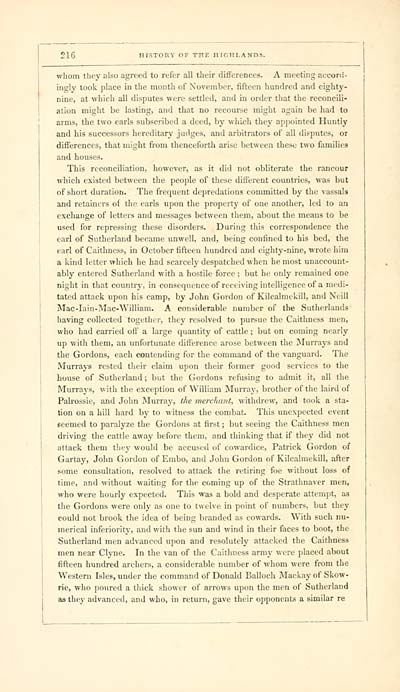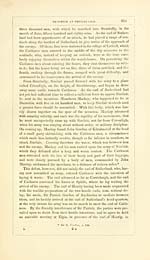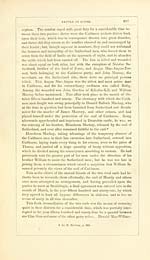Download files
Complete book:
Individual page:
Thumbnail gallery: Grid view | List view

216 histohy of the highlands.
whom they also agreed to refer all their differences. A meeting accord-
ingly look place in the montli of November, fifteen hundred and eighty-
nine, at which all disputes were settled, and in order that the reconcili-
ation might be lasting, and that no recourse might again be had to
arms, the two earls subscribed a deed, by which they appointed Huntly
and his successors hereditarj' judges, and arbitrators of all disputes, or
difTerences, that might fiom thenceforth arise between these two families
and houses.
This reconciliation, however, as it did not obliterate the rancour
which existed between the people of these different countries, was but
of short duration. The frequent depredations committed by the vassals
and retainers of the earls upon the property of one another, led to an
exchange of letters and messages between them, about the means to be
used for repressing these disorders. During this correspondence the
earl of Sutherland became unwell, and, being confined to his bed, the
earl of Caithness, in October fifteen hundred and eighty-nine, wrote hira
a kind letter which he had scarcely despatched when he most unaccount-
ably entered Sutherland with a hostile force ; but he only remained one
night in that countrj-, in consequenceof receiving intelligence of a medi-
tated attack upon his camp, by John Goidon of Kilcalmekill, and Neill
Mac-Iain-Mac-William. A considerable number of the Sutherlands
having collected together, they resolved to pursue the Caithness men,
who had carried off a large quantity of cattle ; but on coming nearly
up with them, an unfortunate difference arose between the ^Nlurrays and
the Gordons, each contending for the command of the vanguard. The
Murrays rested their claim upon their former good services to the
house of Sutherland ; but the Gordons refusing to admit it, all the
Murrays, with the exception of William Murray, brother of the laird of
Palrossie, and John Murray, tJie merchant, withdrew, and took a sta-
tion on a hill hard bj' to witness the combat. This unexpected event
seemed to paralyze the Gordons at first ; but seeing the Caithness men
driving the cattle away before them, and thinking that if they did not
attack them they would be accused of cowardice, Patrick Gordon of
Gartay, John Gordon of Erabo, and John Gordon of Kilcalmekill, after
some consultation, resolved to attack the retiring foe without loss of
time, and without waiting for the coming up of the Strathnaver men,
who were hourly expected. This was a bold and desperate attempt, as
the Gordons were only as one to twelve in point of numbers, but they
could not brook the idea of being branded as cowards. With such nu-
merical inferiority, and with the sun and wind in their faces to boot, the
Sutherland men advanced upon and resolutely attacked the Caithness
men near Clyne. In the van of the Caithness army were placed about
fifteen hundred archers, a considerable number of whom were from the
Western Isles, under the command of Donald Balloch Mackay of Skow-
rie, who poured a thick shower of arrows upon the men of Sutherland
as they advanced, and who, in return, gave their opponents a similar re
whom they also agreed to refer all their differences. A meeting accord-
ingly look place in the montli of November, fifteen hundred and eighty-
nine, at which all disputes were settled, and in order that the reconcili-
ation might be lasting, and that no recourse might again be had to
arms, the two earls subscribed a deed, by which they appointed Huntly
and his successors hereditarj' judges, and arbitrators of all disputes, or
difTerences, that might fiom thenceforth arise between these two families
and houses.
This reconciliation, however, as it did not obliterate the rancour
which existed between the people of these different countries, was but
of short duration. The frequent depredations committed by the vassals
and retainers of the earls upon the property of one another, led to an
exchange of letters and messages between them, about the means to be
used for repressing these disorders. During this correspondence the
earl of Sutherland became unwell, and, being confined to his bed, the
earl of Caithness, in October fifteen hundred and eighty-nine, wrote hira
a kind letter which he had scarcely despatched when he most unaccount-
ably entered Sutherland with a hostile force ; but he only remained one
night in that countrj-, in consequenceof receiving intelligence of a medi-
tated attack upon his camp, by John Goidon of Kilcalmekill, and Neill
Mac-Iain-Mac-William. A considerable number of the Sutherlands
having collected together, they resolved to pursue the Caithness men,
who had carried off a large quantity of cattle ; but on coming nearly
up with them, an unfortunate difference arose between the ^Nlurrays and
the Gordons, each contending for the command of the vanguard. The
Murrays rested their claim upon their former good services to the
house of Sutherland ; but the Gordons refusing to admit it, all the
Murrays, with the exception of William Murray, brother of the laird of
Palrossie, and John Murray, tJie merchant, withdrew, and took a sta-
tion on a hill hard bj' to witness the combat. This unexpected event
seemed to paralyze the Gordons at first ; but seeing the Caithness men
driving the cattle away before them, and thinking that if they did not
attack them they would be accused of cowardice, Patrick Gordon of
Gartay, John Gordon of Erabo, and John Gordon of Kilcalmekill, after
some consultation, resolved to attack the retiring foe without loss of
time, and without waiting for the coming up of the Strathnaver men,
who were hourly expected. This was a bold and desperate attempt, as
the Gordons were only as one to twelve in point of numbers, but they
could not brook the idea of being branded as cowards. With such nu-
merical inferiority, and with the sun and wind in their faces to boot, the
Sutherland men advanced upon and resolutely attacked the Caithness
men near Clyne. In the van of the Caithness army were placed about
fifteen hundred archers, a considerable number of whom were from the
Western Isles, under the command of Donald Balloch Mackay of Skow-
rie, who poured a thick shower of arrows upon the men of Sutherland
as they advanced, and who, in return, gave their opponents a similar re
Set display mode to: Large image | Transcription
Images and transcriptions on this page, including medium image downloads, may be used under the Creative Commons Attribution 4.0 International Licence unless otherwise stated. ![]()
| Early Gaelic Book Collections > Ossian Collection > History of the Highlands and of the Highland clans > Volume 1 > (322) |
|---|
| Permanent URL | https://digital.nls.uk/79676461 |
|---|
| Description | Vol. I. |
|---|---|
| Shelfmark | Oss.247 |
| Additional NLS resources: | |
| Attribution and copyright: |
|
| Description | Selected books from the Ossian Collection of 327 volumes, originally assembled by J. Norman Methven of Perth. Different editions and translations of James MacPherson's epic poem 'Ossian', some with a map of the 'Kingdom of Connor'. Also secondary material relating to Ossianic poetry and the Ossian controversy. |
|---|
| Description | Selected items from five 'Special and Named Printed Collections'. Includes books in Gaelic and other Celtic languages, works about the Gaels, their languages, literature, culture and history. |
|---|

